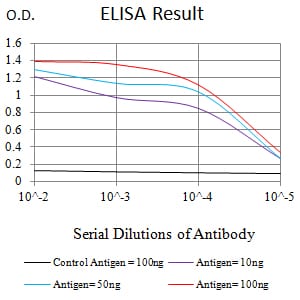

| WB | 咨询技术 | Human,Mouse,Rat |
| IF | 咨询技术 | Human,Mouse,Rat |
| IHC | 咨询技术 | Human,Mouse,Rat |
| ICC | 1/200 - 1/1000 | Human,Mouse,Rat |
| FCM | 咨询技术 | Human,Mouse,Rat |
| Elisa | 1/10000 | Human,Mouse,Rat |
| Aliases | BFGF; FGFB; FGF-2; HBGF-2 |
| Entrez GeneID | 2247 |
| clone | 1D6B5 |
| WB Predicted band size | 30.7kDa |
| Host/Isotype | Mouse IgG1 |
| Antibody Type | Primary antibody |
| Storage | Store at 4°C short term. Aliquot and store at -20°C long term. Avoid freeze/thaw cycles. |
| Species Reactivity | Human |
| Immunogen | Purified recombinant fragment of human FGF2 (AA: 143-288) expressed in E. Coli. |
| Formulation | Purified antibody in PBS with 0.05% sodium azide |
+ +
以下是3-4条关于FGF2抗体的参考文献及其摘要概括:
---
1. **文献名称**:*Fibroblast growth factors: from molecular evolution to roles in development, metabolism and disease*
**作者**:Ornitz, D.M. & Itoh, N.
**摘要**:综述了FGF家族(包括FGF2)的分子结构、功能及信号通路,提到FGF2抗体在定位组织分布和信号调控研究中的应用。
2. **文献名称**:*The FGF family: biology, pathophysiology and therapy*
**作者**:Beenken, A. & Mohammadi, M.
**摘要**:分析FGF家族在生理和病理中的作用,强调FGF2抗体在阻断受体结合及治疗性研究(如癌症和血管疾病)中的实验用途。
3. **文献名称**:*FGF signalling in tumourigenesis*
**作者**:Turner, N. & Grose, R.
**摘要**:探讨FGF2在肿瘤血管生成和转移中的作用,提及使用特异性抗体抑制FGF2活性以评估其在癌症模型中的治疗效果。
4. **文献名称**:*FGF2-induced angiogenesis in critical limb ischemia: antibody-based therapeutic targeting*
**作者**:Sorensen, V. et al.
**摘要**:研究FGF2在缺血组织中的表达,通过抗体中和实验验证其促血管生成功能,为抗FGF2治疗提供实验依据。
---
以上文献涵盖基础机制、病理研究及治疗应用,均涉及FGF2抗体的实验或临床用途。
Fibroblast Growth Factor 2 (FGF2), also known as basic FGF, is a multifunctional protein belonging to the FGF family, which regulates cellular processes such as proliferation, differentiation, angiogenesis, and tissue repair. FGF2 antibodies are essential tools for detecting, quantifying, and functionally characterizing this growth factor in both research and clinical contexts. These antibodies are widely used in techniques like Western blotting, immunohistochemistry (IHC), immunofluorescence (IF), and enzyme-linked immunosorbent assays (ELISA) to study FGF2 expression patterns in development, homeostasis, and disease.
FGF2 exists in multiple isoforms (e.g., 18 kDa cytoplasmic and higher molecular weight nuclear forms) due to alternative translation initiation, and specific antibodies are designed to target distinct epitopes or post-translational modifications. This specificity allows researchers to investigate isoform-specific roles in pathologies, including cancer, fibrosis, and cardiovascular disorders. For instance, FGF2 overexpression is linked to tumor angiogenesis and metastasis, making its antibodies valuable in oncology research.
Therapeutic FGF2-neutralizing antibodies are also explored to block aberrant FGF signaling in diseases. Commercially available FGF2 antibodies vary by clonality (monoclonal/polyclonal), species reactivity, and applications, requiring validation for experimental reproducibility. Understanding FGF2’s interaction with receptors (FGFRs) and heparan sulfate proteoglycans further underscores the importance of high-affinity antibodies in elucidating its complex signaling networks. Overall, FGF2 antibodies remain indispensable for advancing both basic research and targeted therapies.
×